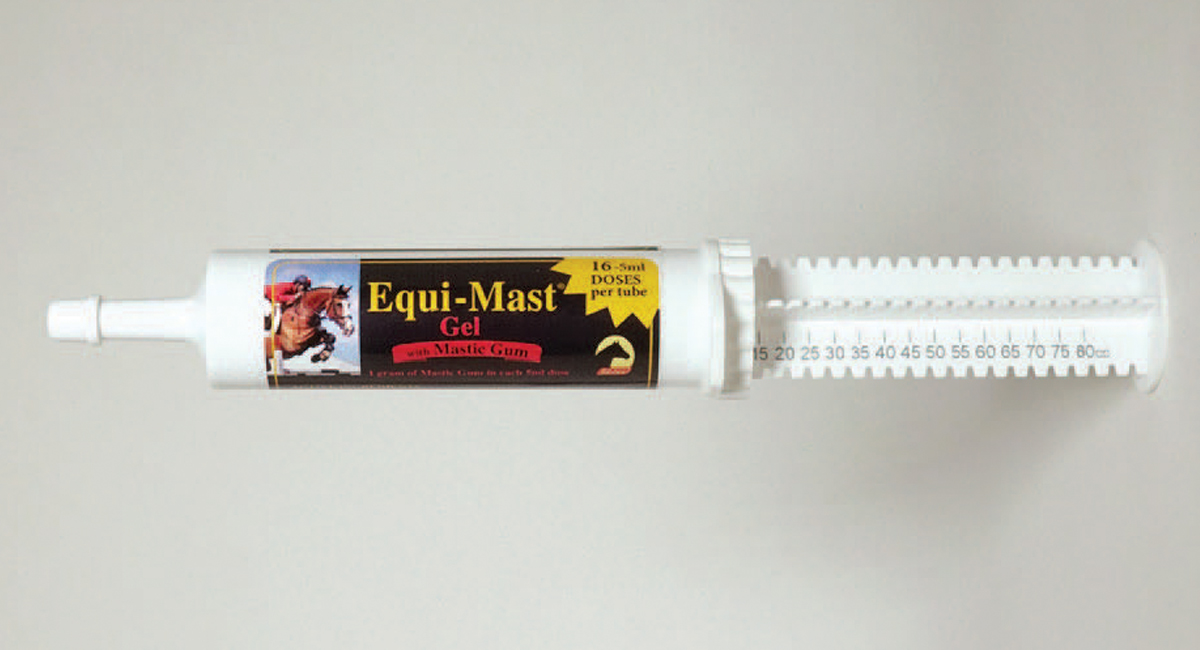NEW 16-Dose Gel Tube
Kaeco Equi-Mast® Gel is designed as an equine digestive aid to assist in maintaining a healthy equine gastrointestinal system and to support in the control of stomach ulcers. Ideal for race and performance horses and foals.
Clinical Signs:
The majority of horses with gastric ulcers do not show outward clinical signs.
They have more subtle signs such as:
Note that horses that look completely healthy can also have gastric ulcers. Approximately half of the horses presented for colic at UC Davis have gastric ulcers and often it is hard to know whether the colic is the result of ulcers or the other way around.*
Guaranteed Analysis per 5ml Dose:
Directions for Use:
Adult Horses and Foals – Feed one 5ml dose per day.
Use Equi-Mast® Gel daily as an equine digestive aid for stabled horses, performance horses that are trailered, horses in training and horses under high stress.
Ingredients:
Soy Oil, Mastic Gum, Soy Lecithin, FOS – Prebiotics, Anhydrous dextrose, Silicon Dioxide, dried Lactobacillus acidophilus fermentation product, dried Lactobacillus plantarum fermentation product, dried Lactobacillus casei fermentation product, dried Enterococcus faecium fermentation product and artificial flavor.
Safe use in pregnant animals or animals intended for breeding has not been proven. If animal’s condition worsens or does not improve, stop product administration and consult with your veterinarian.
DOES NOT TEST
• Poor appetite
• Dullness
• Attitude changes
• Decreased performance
• Reluctance to train
• Poor body condition
• Poor hair coat
• Weight loss
• Excessive time spent lying down
• Low grade colic
• Grinding of teeth and drooling
• Loose feces
Available In: 80ml Dial-A-Dose Oral Gel Tube (16 – 5ml Doses)
Visit www.Kaeco.com
Equi-Mast® 16 Dose Gel 80ml dial a dose tube – 5ml daily dose
Kaeco has recently received a fourth patent for our Equi-Mast Gastric Formula!
Kaeco Equi-Mast® is designed as an equine digestive aid to assist in maintaining a healthy equine gastrointestinal system and to support in the control of stomach ulcers. Ideal for race and performance horses.
Our new daily dose tube provides an accurate and easy method to deliver our proven product.
U.S. Patent #’s 9,694,042 ; 9,993,498 ; 10,548,917 and 11,439,676.
Most foals with gastric ulcers do not exhibit clinical signs. Clinical signs become apparent when the ulceration is widespread
or severe. Although it is most commonly recognized in older weanling foals, gastric ulceration has also been reported in
neonatal foals as young as 24h. (Lewis, S. Gastric ulceration in an equine neonate. Can Vet J. 2003; 44:420-1)
Importantly, when a foal exhibits clinical signs, the ulcers are severe and should be diagnosed and treated immediately.
A foal will begin to secrete gastric acid from 2 days of age onwards. (Merck Veterinary Manual 2018)
Nursing was associated with an abrupt increase in gastric pH and, conversely, gastric pH became highly acidic when foals
remained recumbent and did not suck for more than 20 min. (Sanchez et al. 1998)
Mastic Gum
The aromatic, pine-like flavor of Chios Mastiha has been valued for thousands of years in food preparation, especially festive
fare. It has also been famous for its ability to safely relieve a wide variety of digestive disorders from bad breath to peptic
ulcers, and was even the preferred treatment for cholera; it was thought to be the first natural chewing gum.
A 1998 study by the University of Athens found that Mastiha resin oil has both antibacterial and antifungal properties. A 1998
study by Nottingham University, published in the New England Journal of Medicine, found that Mastiha heals peptic ulcers,
and is specifically effective against several strains of the ulcer-causing bacterium helicobacter pylori. (Mastic Gum Kills
Helicobacter pylori N Engl J Med 1998: 339:1946)
Lecithin
Lecithin is a naturally occurring fatty substance or phospholipid. Found in both plant and animal tissue, soybeans are the most
widely recognized source of lecithin. Feeding Lecithin has been shown to be an aid in protecting gastric tissue from ulcer
injury in horses. It is believed to support the anti-ulcer defenses of the stomach in two ways: first, it forms a barrier between
stomach contents and epithelial cells and second, it helps with cell membrane turnover and wound resealing.
Prebiotics and Probiotics
Probiotics are live “good” microorganisms, such as bacteria and yeast. In horse supplements common probiotics include
Enterococcus faecium, Lactobacillus acidophilus, Lactobacillus caseii and Lactobacillus plantarum. Millions to billions
of colony forming units (CFU’s) are included per serving. In contrast, prebiotics are the foods that feed the probiotics.
Examples included in equine supplements include fructooligosaccharides (FOS), xylooligosaccrarides (XOS) polydextrose,
pectin and psyllium.
Your horse does not digest these food ingredients. Instead, prebiotics are digested by “good” microorganisms and probiotics in
the horse’s digestive system to increase their numbers or activity. In horses, veterinarians primarily recommend prebiotics and
probiotics for GI-related concerns, such as diarrhea, to encourage the growth of the good microbes and to minimize the invasion
and growth of disease-causing bacteria. For example, antibiotic administration, stress, transport, abrupt dietary changes, and
Clostridium or Salmonella infections can potentially alter the normal microbe population in a horse’s large intestine.
* By Jorge Nieto, PhD, Dipl. ACVS- Reprinted from The Horse Report with permission from the Center for Equine Health, School of Veterinary Medicine,
University of California, Davis (UC Davis).
Kaeco Group, Inc.
P.O. Box 89
Savannah, MO 64485-0089
800.228.1211 • Fax 816.324.6279
kaeco@stjoelive

News from the horse industry. Sharing today’s information as it happens. The Northwest Horse Source is not responsible for the content of 3rd party submissions.






